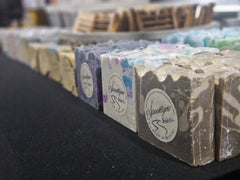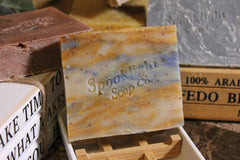Handcrafted soaps are priced higher because they are made with superior, natural ingredients compared to the conventional soaps available in big-box retailers. These artisanal soaps, unlike mass-produced variants, are genuine soaps and not just cleansers filled with synthetic chemicals.

The industrial soap-making process often removes beneficial components like glycerine, repurposing them into pricier cosmetic items. However, handcrafted soaps retain glycerine, enriching the skin during use.
The ingredients in handcrafted soaps, such as natural fats, lye, and additions like oatmeal, cocoa, sea salts, shea butter, and essential oils, are of higher quality and thus more costly. These soaps are produced in small quantities and require labor-intensive processes, contributing to their higher prices. The smaller production scale and handcrafted packaging further elevate costs.
Prices for simpler handcrafted soaps start around $8 to $9 per bar, with premium varieties reaching up to $50, owing to their high-quality, all-natural components that benefit the skin. Making these soaps involves not only costly ingredients but also a significant amount of space and specialized equipment, making the craft an expensive endeavor.
Handcrafted soaps boast all-natural ingredients, setting them apart from commercial soaps that may contain synthetic chemicals extending shelf life but potentially compromising skin health. The absence of these chemicals in artisanal soaps means they are more skin-friendly but also have a shorter shelf life, a factor reflected in their price.
The process of making handcrafted soap is meticulous, with each batch mixed and cured by hand, demanding time, skill, and attention to detail. This manual effort, along with the use of expensive fragrances and custom molds for unique shapes and sizes, adds to the cost. Additionally, the limited production capacity of small-scale soap makers cannot match the economies of scale of commercial producers, leading to higher prices for these bespoke products.
Handcrafted soaps cater to various niche markets, including vegan and hypoallergenic options, which are not always available in mass-market products. The demand for these premium, natural soaps has grown, driven by consumers seeking alternatives to commercial soaps that may trigger allergies or contain undesirable chemicals.
In summary, handcrafted soaps command higher prices due to the quality of their ingredients, the labor-intensive production process, their bespoke nature, and the increasing consumer demand for natural, skin-friendly products.








